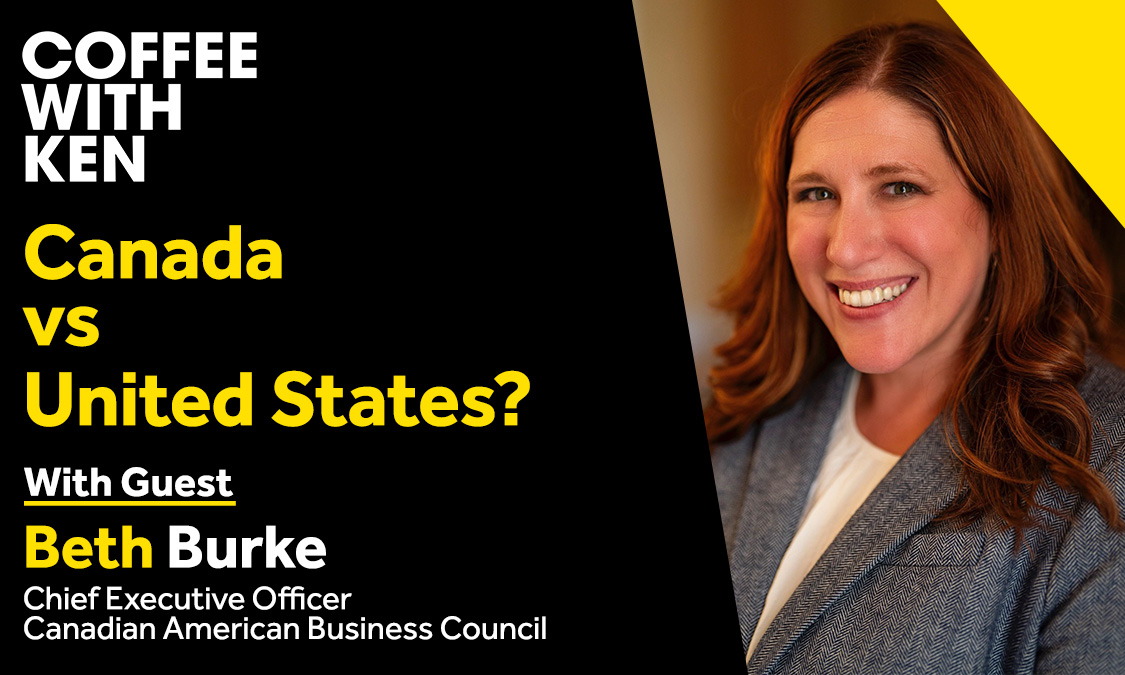Canada vs United States?
March 4, 2025In this thought-provoking episode of Coffee With Ken, Ken sits down with Beth Burke, President of the Canadian American Business Council, to explore the evolving dynamics of U.S.-Canada trade, security, and economic collaboration.
With President Trump imposing a 10% universal tariff on U.S. imports, including key trade partners like Canada and Mexico, this discussion comes at a critical time. The conversation dives deep into how these policies could impact businesses, supply chains, and industries that rely on cross-border trade.
Key Takeaways from the Conversation:
- The U.S.-Canada Relationship: More than just friendly neighbors, the two nations have a deeply interconnected economic and political bond. However, recent tensions, including trade disputes, tariffs, and security concerns, have put new pressures on this historic partnership.
- Tariffs & Trade Under the Trump Administration: Beth discusses the economic consequences of new tariffs, how businesses on both sides of the border are preparing, and why a shift toward economic protectionism could have widespread effects on industries like automotive, manufacturing, and natural resources.
- Fentanyl & Border Security: Security concerns, including drug trafficking and border policies, have also shaped U.S.-Canada relations. Beth explains Canada’s recent efforts, including appointing a fentanyl czar, strengthening security measures, and working alongside U.S. officials to address shared challenges.
- The Auto Industry & Supply Chain Risks: The auto industry is one of the most deeply integrated sectors between the U.S. and Canada, with car parts crossing the border multiple times before final assembly. Tariffs could cause major disruptions, leading to higher costs for consumers and potential job losses in both countries.
- Business Strategy Amid Political Uncertainty: With leadership transitions on both sides—Canada’s upcoming election and the U.S. presidential race—businesses are being forced to rethink investments, expansion plans, and supply chain strategies. Some are holding back on U.S. expansion due to unpredictable trade policies.
- Economic & Security Cooperation: Instead of focusing on tariffs and trade restrictions, Beth argues that the U.S. and Canada should double down on collaboration, particularly in critical minerals, energy, infrastructure projects, and regulatory alignment. The two nations also have a long history of joint military and security cooperation, including their NORAD partnership for defense operations.
Why This Conversation Matters:
- $3 billion in goods and services cross the U.S.-Canada border daily
- 400,000 people travel between the two countries every day
- Canada is one of the largest trade partners for the U.S.
- Disruptions in trade and security could impact businesses, workers, and consumers on both sides of the border
As Beth Burke puts it, the U.S.-Canada relationship is like a marriage—there may be disagreements, but at the end of the day, the bond remains strong. The key moving forward is finding opportunities for economic growth, security collaboration, and long-term stability rather than focusing on trade conflicts and political divides.

